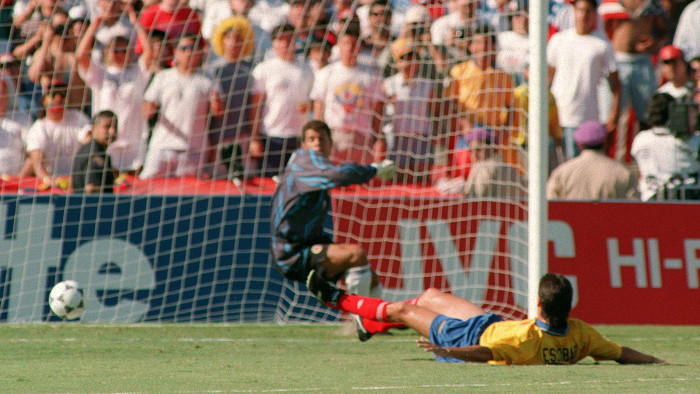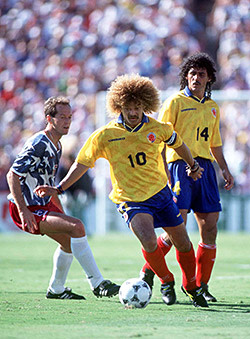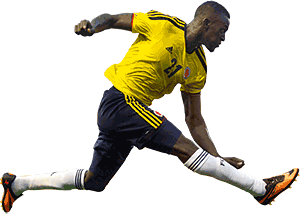Colombia – playing for peace at the World Cup?

Simply sign up to the Life & Arts myFT Digest -- delivered directly to your inbox.
Here’s a prediction: if Colombia wins the World Cup on July 13, a lasting peace agreement ending decades of civil warfare will be signed within a fortnight.
Colombia’s celebrated diversity is geographical and cultural, from the Afro-Colombians of the Pacific coast to the Andean highlands of Bogotá, Carnival on the Caribbean coast and indigenous communities in the Amazon. Few things bring Colombians together like their selección, the national football team. Colombia’s national sport used to be cycling, with radio commentary on the Vuelta uniting villagers and townspeople across the nation from the 1940s to the 1970s. The sport remains a source of great pride, as when Colombian cyclists Nairo Quintana and Rigoberto Urán came first and second in the Giro d’Italia last week. But now 46 million Colombians – more than three million of whom live abroad and over five million of whom have been internally displaced by conflict according to UNHCR, the UN refugee agency – dream of footballing success. It might just happen.
WORLD CUP SPECIAL

Italy
Exclusive interview with top player Andrea Pirlo
Spain
How the reigning champions plan to do it again
Argentina
Can Messi ‘the Messiah’ live up to his name?
England
Why are they so bad
at penalties?
Cameroon
The team with ‘hemle’ and Samuel Eto’o on their side
Brazil
One man, a country’s hopes: superstar Neymar
Bosnia & Herzegovina
Their manager talks strategy for their debut World Cup
United States
How the US learnt to
love soccer
My friend Pele
An ‘imperialist Yankee’ reminisces
How to save a penalty
Dutch goalkeeper
Michel Vorm explains
Colombian football’s golden age was a long time ago, back in 1950, when the country’s teams lured global stars in return for lucrative paydays. It was then that the late Nobel Prize-winning author Gabriel García Márquez became a football fan. Watching his local team, Junior de Barranquilla, play against the great Alfredo di Stéfano’s Millionarios, García Márquez wrote, “For the first time I lost my sense of the ridiculous.”

However, many foreign fans recall Colombia only for its generation of World Cup flops. In 1994 Faustino Asprilla, Carlos Valderrama, Freddy Rincón and René Higuita were tipped by many – including Pelé, García Márquez and drug lord Pablo Escobar – to go to the US and win. Bad luck and poor preparation did for them in the group stage. Days after returning to Colombia, defender Andrés Escobar (no relation) was the fatal victim of crossfire in a Medellín shootout. It was widely reported that he had been killed as retribution for scoring an own goal against the US. That is still disputed but many found the story all too plausible. Either way, the sad fact is that Escobar was just another of the hundreds of thousands of victims of the political and narco-violence that ripped the country apart in the 1990s.
In 2002 I was living in Bogotá, deciphering aged military plans in the national archives. While the rest of the world obsessed about the World Cup in Japan and South Korea, Colombians looked on from afar, their mediocre team having failed to qualify, as they would again in 2006 and 2010. Bogotá’s drab, cold weather, combined with reports of the escalating, state-led violence in the countryside, made it a dismal place to be. Colombia’s absence from the world’s celebration of football made it even worse.

This year things look brighter – off the field and on. Colombia qualified second behind Argentina in the South American competition. All Colombia’s qualifying matches were played with a specially designed ball known as the “Macondo”, in homage to the fictional town where García Márquez’s novel One Hundred Years of Solitude (1967) was set. Players said this inspired them. The team was rigorous, organised and blessed with a one-in-a-generation goalscorer, Radamel Falcao, now of Monaco. Unfortunately, Falcao suffered a bad knee injury in January and despite reports of a miraculous recovery, has confirmed that he will not be heading to Brazil, saying he is “still not ready” and does not want to “take a place away from one of my teammates who is 100 per cent fit”.
This is also a hopeful moment for peace in Colombia. President Juan Manuel Santos, descendant of presidents, was elected in 2010. He was the nominated heir of Alvaro Uribe, who had made great gains in expanding state control of the national territory, cutting homicide rates and increasing economic growth and foreign investment. However, Uribe’s presidency was also marked by terrible human rights violations and not-so-covert alliances with paramilitary groups which had taken on the guerrillas. Santos has made big gestures to distance himself from Uribe’s hardline stances. Crucially, he has come out against the “war on drugs” and has also launched a peace process with the guerrilla group Farc; Colombian officials and Farc have now reached agreements on agrarian reform and other sticking points.
Following Colombia’s most recent presidential elections, held on May 25, Santos is currently in second place to Oscar Zuluaga, who ran on an anti-peace-process ticket supported by Uribe. However, an election run-off will be held on June 15, the day after Colombia’s first match against Greece. Santos has attempted to frame the run-off as a referendum on a peace/war question – and the national mood on voting day will certainly be affected by the team’s performance against Greece. Football, and the hopes for national unity that it can represent, will play a significant role in this potentially epoch-marking election.
Matthew Brown is the author of “From Frontiers to Football: An Alternative History of Latin America Since 1800”, published by Reaktion on July 15. He teaches at Bristol University
To comment on this article please post below, or email magazineletters@ft.com
Comments